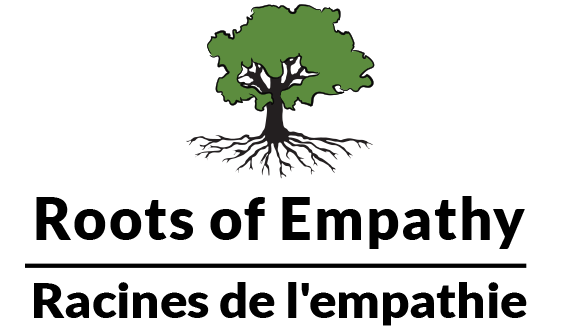Statement by Mary Gordon, Roots of Empathy Founder/President
Our Canadian offices, virtual and head office, will be closed Friday, September 30th, to observe National Day for Truth and Reconciliation and Orange Shirt Day. As is our tradition, this is a day that we don’t work in honour of learning the truths and reconciling the wrongs done not just to the children who went through residential school but all the suffering and injustice that Indigenous Peoples have endured.
We pause in order to learn and reflect. We are asking our Canadian staff to learn something they didn’t know before about Truth and Reconciliation and share it with another. The world changes when we care together and share together.
The National Day for Truth and Reconciliation stemmed from 94 calls to action in a 2015 report from the Truth and Reconciliation Committee (TRC) that aim to repair harm caused by residential schools and move forward to reconcile Canadians and Indigenous Peoples.
It coincides with Orange Shirt Day, which is an Indigenous-led grassroots commemoration that began at an event in May 2013, where survivor, Phyllis Webstad, a Northern Secwepemc (Shuswap) woman told her story. In 1973, she was six years old and living on Dog Creek Reserve in Fraser Valley British Columbia with her grandmother. She and her grandmother went to the local store to buy a “shiny orange shirt” that she was excited to wear to her first day of school. Her school was a residential school, and when she arrived, she was stripped and her own clothes were taken away. She has said, “The colour orange has always reminded me of that and how my feelings didn’t matter, how no one cared and how I felt like I was worth nothing. All of us little children were crying, and no one cared.” [i]
The colour orange and the date grew into a significant symbolic movement. September was the time in our history when Indigenous children were taken to residential schools and this timing allows us to reflect deeply at the start of the school year about what was taken away from Indigenous children – culture, language, freedom, self-esteem; and how important it is that “Every Child Matters”.
As we have encouraged our staff, we encourage our supporters, as outlined by the TRC, to learn and use this day, “to honour survivors, their families, and communities” as “public commemoration of the history and legacy of residential schools remains a vital component of the reconciliation process.”
The Honourable Justice Murray Sinclair, whose Ojibway name is Mizanay Gheezhik, was the Chair of the Truth and Reconciliation Commission of Canada amid a lifetime of public service and social justice work. We were honoured that he graciously accepted the Roots of Empathy Award in Social Justice in 2021 at our Research Symposium, and spoke about reconciliation.
In his acceptance, His Honour explained that it was challenging to get Canadians to care about the oppression of Indigenous people. “The best way to get them to see that this was about children is to make [Canadians] think about their own children, make [Canadians] think about what they would feel like and how they would feel if this would happen to [Canadians], to their children.” He concluded with, “And that’s what empathy is – empathy is the ability to put yourself into the place of the other person and look at it from the other side of the street.”
If you are non-indigenous person, how can you do more to put ourselves into the place of the Indigenous Peoples?
With the day on September 30th, here are some suggestions to reflect on the Indigenous experience and honour the survivors:
1. Start reading the Truth and Reconciliation Commission Report(s)
- Begin with the Summary. Especially within the Summary – try to read the Calls to Action (page 319 or 326) depending on how your pdf reader works.
- Other TRC reports can be found here: https://nctr.ca/records/reports/#trc-reports
2. Please wear an orange shirt and read more about survivors like Phyllis Webstad.
3. Consume education materials. His Honour Justice Sinclair has reflected that, “Education is what got us into this mess, and education will get us out.”
4. Go to a commemorative event
- There are some listed here on the official TRC site but check your local listings and your sources for others, or what may be around you.
This is a small list. There are many possibilities to reflect on past harms, and learn about Indigenous communities and cultures today.
On September 18th, I was deeply moved by the well-researched and thoughtful apology issued by the Canadian Mental Health Association. I was equally encouraged by the Toronto District School Board’s decision to revise the Grade 11 English curriculum to focus on Indigenous writers board-wide, along with the efforts of other boards who have already included Indigenous materials and perspectives.
At ROE, we believe that by embracing vulnerability, we create space for genuine empathic connection. It feels as though Canadians are finally beginning to confront the wrongs of the past—first by learning about them, then apologizing, and finally by taking action to ensure history doesn’t repeat itself.
Mary Gordon
Roots of Empathy Founder/President


